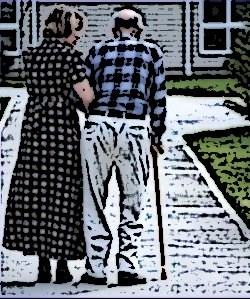CITY POLICE
NEWS RELEASE
************************* At-risk driver program
In the Algoma District there are approximately 2,000 people with Alzheimer’s disease and related dementia.
The district has an aging population and the numbers are growing.
The issue of persons with dementia and continuing to drive, after they have been deemed medically unsafe to do so, is becoming more and more of a concern throughout the province.
To react quickly to potentially dangerous traffic conditions requires concentration, good judgment along with the ability to reason and make decisions.
Unfortunately many of these skills are impaired in people with dementia.
The Sault Ste. Marie Police Service in partnership with the Alzheimer Society and the Dementia Care Network Algoma are introducing to our community and the district the "At Risk Driver" program in an attempt to deal with this issue and to assist families and caregivers who are coping with a cognitively impaired driver.
Program purpose
The At Risk Driver Program will provide families and caregivers with a program that helps to facilitate the safe return of the cognitively impaired person whose license has been revoked by the Ministry of Transportation yet continues to drive.
The ultimate purpose of the program is to improve road safety for all members of the community.
Program will also assist to:
- Reduce the incidence of cognitively impaired drivers who continue to drive.
- Provide an option for family members and caregivers who are concerned about the person who continues to drive.
- Provide Sault Ste. Marie Police Service with necessary information to assist cognitively impaired drivers.
- Increase awareness of families and caregivers of the impact that dementia has on driving ability.
- Increase community awareness of dementia and driving issues.
How it will work
- Complaint/ concern expressed by a caregiver/ family member that a person with dementia whose license has been revoked who continues to drive.
- The agency receiving the concern/complaint will explain the At Risk Driver Program.
- The registration form is completed by the complainant.
- The agency receiving the concern/ complaint will forward the completed registration form to the Alzheimer Society.
- The Alzheimer Society will forward the original registration form to the Sault Ste. Marie Police Service. A copy of the form will be maintained at the Alzheimer Society.
- The Sault Ste. Marie Police Service will process the At Risk Driver Program registration form as a police information report – general incident.
- On the Canadian Police Information Centre (CPIC) database, the cognitively impaired driver will be identified as a “Special Interest to Police” and will be flagged as such when his/her license place or name is processed.
- Should the police stop a person who is registered in the At Risk Driver Program, they will notify the contact person(s) listed on the registration form to facilitate the safe return of the driver. It is the responsibility of the contact person(s) deal with the vehicle.
- Families/caregivers will be responsible for updating information should there be any changes; e.g., person moves person changes vehicles or license plates, person stops driving voluntarily, etc.
- The Alzheimer Society will notify Sault Ste. Marie Police Service of all changes to the information on the registration form.
The At Risk Driver Program was made possible through the collaboration of the members of the Alzheimer Society, Dementia Care Network Algoma and the Sault Ste. Marie Police Service.
This partnership is also involved in the Safely Home® Program for the past 20 years.
Safely Home® Program
As Alzheimer's disease affects each area of the brain, certain functions can be lost.
These may include the ability to recognize familiar places, the ability to remember one's own name or address, or the ability to communicate.
The loss of these abilities can result in changes in a person's behaviour.
For example, a person may leave home, become confused and get lost.
This behaviour can be dangerous for people with Alzheimer's disease.
It is also worrisome for family members and caregivers.
Safely Home® assists police in finding a person who is lost and returning them safely to their home.
It is a nationwide program developed by the Alzheimer Society of Canada in partnership with the Royal Canadian Mounted Police.
Persons in our community that have Alzheimer's or a related disease can become members of the Safely Home® program by registering themselves with the program.
Persons who support these individuals can also register them.
Once a person is registered (the "member"), vital information is stored confidentially on a police database.
This information can be accessed by police anywhere in Canada.
A similar program exists in the United States called Safe Return.
Registration is voluntary.
For a one-time fee of $35, the Alzheimer Society provides:
- An identification bracelet. - A caregiver handbook. - Identification cards. - Updates to the member's file as often as they are provided by the caregivers or the member.
If a member goes missing, the caregiver should contact the local police.
The police, accessing the computer database, will find pertinent information on the member including personal history, physical characteristics and locations where the person is known to visit.
It is important for family members and caregivers to keep an up-to-date photo of the member on hand.
When a member is found, the police use the identification number on the bracelet to search the computer database, and determine where the person lives and whom to contact.
For more information or to register persons please contact the local Alzheimer Society at 705-942-2195.
This pre-planning can avoid a tragedy later.
*************************
